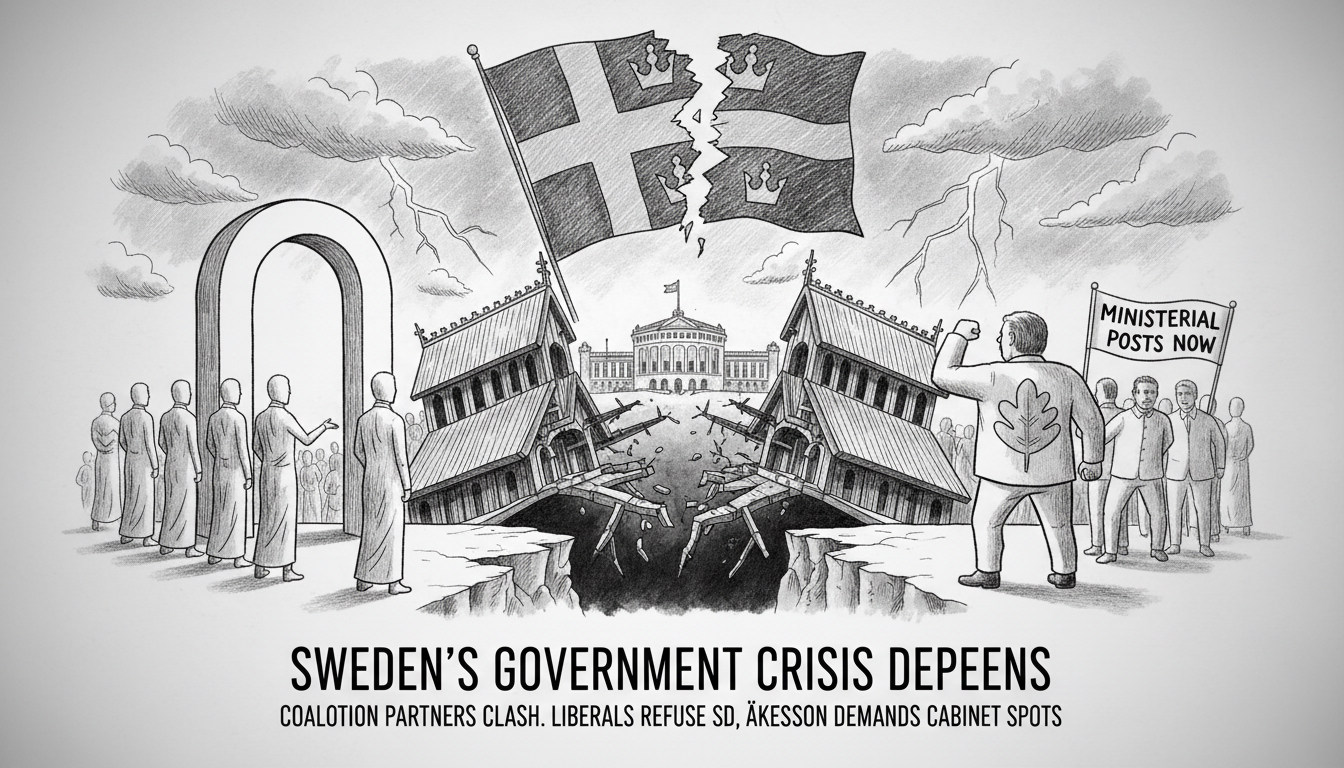Sweden faces a potential government crisis as the Liberal Party and Sweden Democrats clash over future coalition arrangements. The conflict threatens to destabilize the current political landscape ahead of the next parliamentary elections.
Sweden Democrat leader Jimmie Åkesson issued a stark ultimatum to the Liberal Party. He stated his party will not accept exclusion from a potential new Tidö Agreement government. The Sweden Democrats demand ministerial positions or will move into opposition.
Åkesson argued the Liberal Party should concede given the size difference between the parties. He noted the Sweden Democrats currently represent about ten times the support of the Liberals in polls. The Sweden Democrat leader believes his party's larger parliamentary presence justifies inclusion in any future government.
Liberal Party leader Simona Mohamsson responded with equal firmness. She declared the decision rests with Moderate Party leader Ulf Kristersson to resolve the conflict. Mohamsson expressed confidence in finding a solution despite acknowledging the difficulty.
The Liberal Party's national congress decided on Friday to continue supporting a center-right government after the next election. They will maintain cooperation with the Moderate Party and Christian Democrats. The Liberals explicitly ruled out supporting any government that includes Sweden Democrats as formal coalition partners.
Mohamsson reinforced her position during a Saturday speech at the party congress. She confirmed Ulf Kristersson remains the Liberal Party's candidate for prime minister. She praised the current Tidö Agreement cooperation and thanked Kristersson for leading what she called the most liberal government since Ola Ullsten's tenure.
The Liberal leader acknowledged Sweden Democrat contributions to specific policy reforms. She mentioned unemployment insurance changes and expressed hope for school nationalization in any future agreement. Yet she maintained the current cooperation model serves Sweden best.
When questioned why she cannot share government with Åkesson, Mohamsson provided a straightforward answer. She stated Sweden needs a bourgeois government and prime minister. She explicitly classified the Sweden Democrats as outside the bourgeois political family.
This political standoff reflects deeper tensions within Sweden's center-right bloc. The current Tidö Agreement represents a delicate balance where Sweden Democrats support the government without holding ministerial portfolios. The arrangement has enabled policy implementation while maintaining political distance.
Swedish parliamentary dynamics make coalition mathematics crucial. No single party commands majority support. This necessitates complex negotiations and compromises. The current government depends on Sweden Democrat support while maintaining formal distance.
The conflict reveals fundamental questions about political identity and cooperation. Center-right parties grapple with how to manage relationships with the Sweden Democrats. They balance policy goals against ideological compatibility and voter expectations.
International observers watch Swedish coalition politics closely. Nordic countries often model stable minority governments and cross-party cooperation. Sweden's current tensions test this model's resilience.
The outcome will shape Sweden's political direction for years. It affects everything from immigration policy to economic reforms. The resolution—or lack thereof—will determine whether Sweden maintains stable governance or faces political uncertainty.
Both parties appear entrenched in their positions as the next election approaches. The Moderate Party leadership faces the challenging task of mediating between coalition partners. Their success or failure will define Sweden's governing possibilities.
This confrontation represents more than typical political disagreement. It touches on fundamental questions about which parties can legitimately govern together. The resolution will set precedents for future coalition building in Sweden's evolving political landscape.

